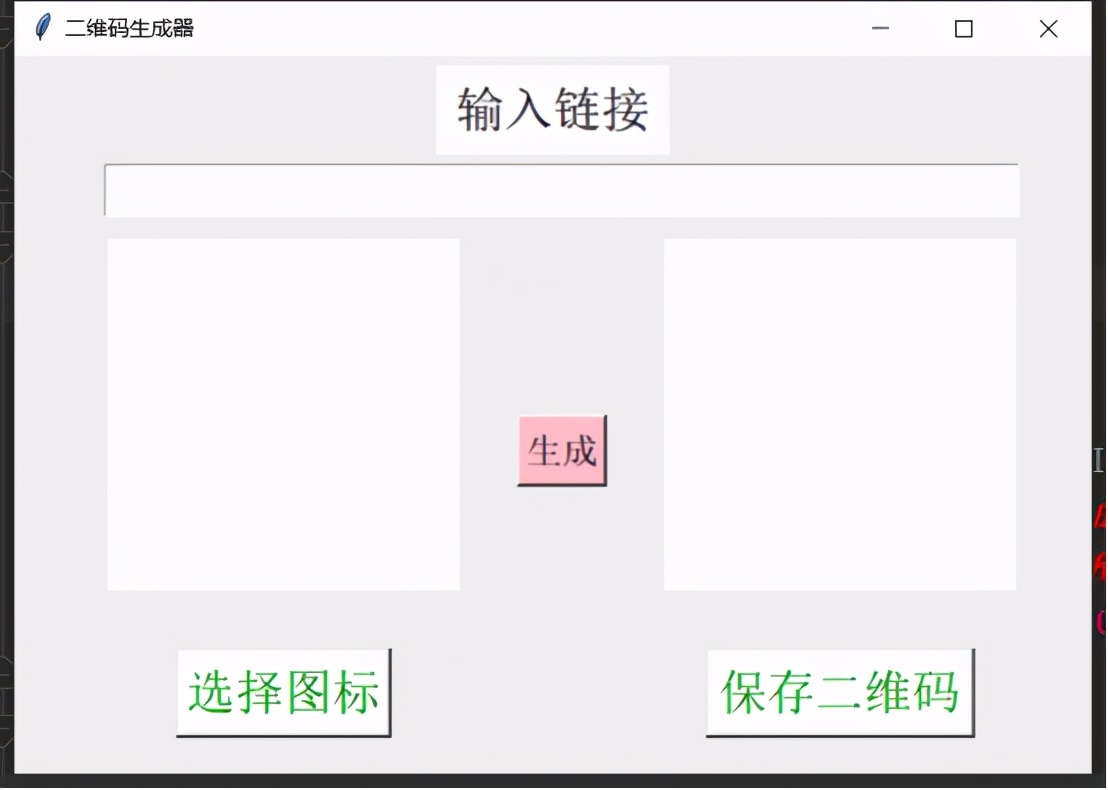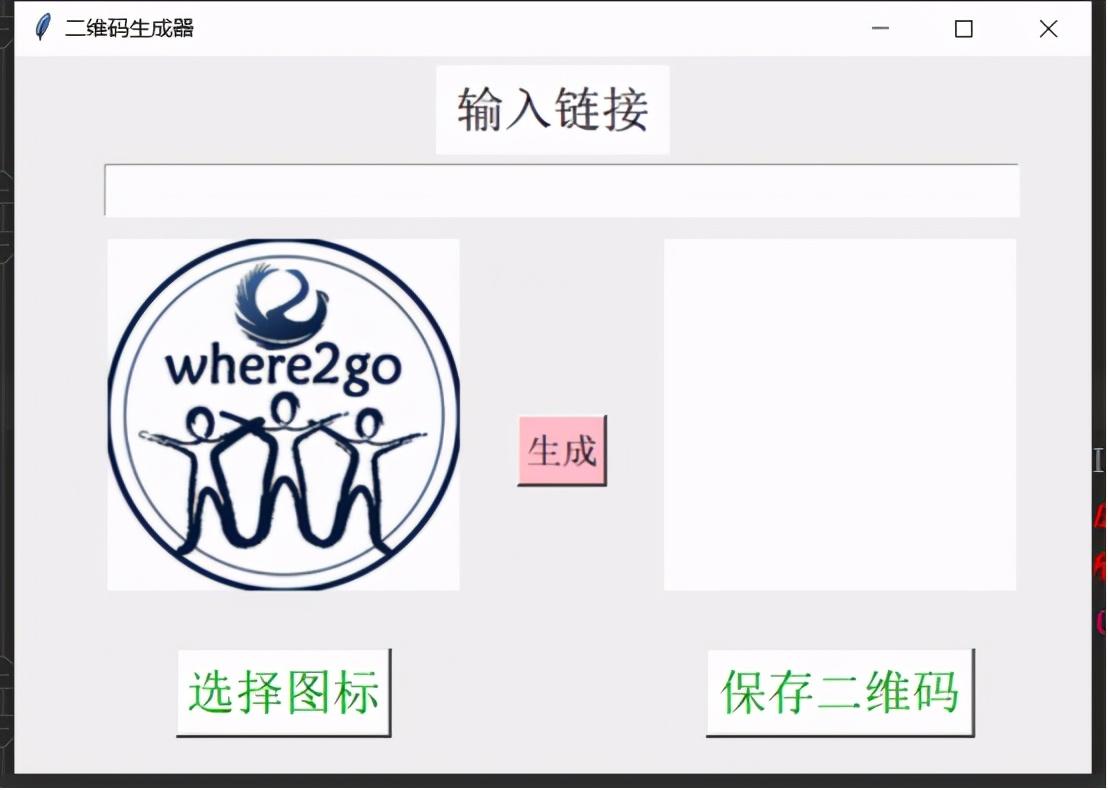жӮЁеҘҪпјҢзҷ»еҪ•еҗҺжүҚиғҪдёӢи®ўеҚ•е“ҰпјҒ
жң¬зҜҮеҶ…е®№дё»иҰҒи®Іи§ЈвҖңPythonжҖҺд№ҲеҲ¶дҪңдәҢз»ҙз Ғз”ҹжҲҗеҷЁвҖқпјҢж„ҹе…ҙи¶Јзҡ„жңӢеҸӢдёҚеҰЁжқҘзңӢзңӢгҖӮжң¬ж–Үд»Ӣз»Қзҡ„ж–№жі•ж“ҚдҪңз®ҖеҚ•еҝ«жҚ·пјҢе®һз”ЁжҖ§ејәгҖӮдёӢйқўе°ұи®©е°Ҹзј–жқҘеёҰеӨ§е®¶еӯҰд№ вҖңPythonжҖҺд№ҲеҲ¶дҪңдәҢз»ҙз Ғз”ҹжҲҗеҷЁвҖқеҗ§!
иҝҷдёӘдәҢз»ҙз Ғз”ҹжҲҗеҷЁжҳҜз”ұqrcodeпјҲз”ҹжҲҗдәҢз»ҙз Ғпјүеә“дёҺtkinterпјҲеӣҫеҪўuiз•Ңйқўпјүз»„жҲҗзҡ„гҖӮйҰ–е…Ҳе…ҲеңЁе‘Ҫд»ӨиЎҢе®үиЈ…д»ҘдёӢдёүдёӘжЁЎеқ—пјҢеҲҶеҲ«жҳҜqrcodeгҖҒimageгҖҒpillowпјҲPILпјүгҖӮе®үиЈ…ж–№ејҸеҫҲз®ҖеҚ•гҖӮ
pip install qrcode pip install image pip install pillow
е®үиЈ…е®Ңж•ҙиҝҮеҗҺзӣҙжҺҘеңЁpyж–Ү件дёӯеҜје…Ҙд»ҘдёӢжЁЎеқ—е’Ңж–№жі•пјҡ
from tkinter import * from tkinter.filedialog import * from PIL import Image,ImageTk import qrcode
1зј–еҶҷuiз•Ңйқў
еҜје…ҘжЁЎеқ—еҗҺзӣҙжҺҘз”ЁtkinterжЁЎеқ—зј–еҶҷuiз•ҢйқўгҖӮе°Ҹзј–иҝҷйҮҢзҡ„uiз•Ңйқўдёәпјҡ

е…·дҪ“д»Јз ҒеҰӮдёӢпјҡ
root = Tk()
root.title("дәҢз»ҙз Ғз”ҹжҲҗеҷЁ")
root.geometry('600x400+400+100')
button1 = Button(root,text = 'йҖүжӢ©еӣҫж Ү',font = ('е®ӢдҪ“',20),fg = 'green',bg = 'white',command = openfile)#и®ҫзҪ®жҢүй’®
button2 = Button(root,text = 'дҝқеӯҳдәҢз»ҙз Ғ',font = ('е®ӢдҪ“',20),fg = 'green',bg = 'white',command = savefile)#и®ҫзҪ®жҢүй’®
button1.place(x = 90,y = 330,width = 120,height = 50)#жҳҫзӨәжҢүй’®
button2.place(x = 385,y = 330,width = 150,height = 50)#жҳҫзӨәжҢүй’®
label1 = Label(root,text = 'иҫ“е…Ҙй“ҫжҺҘ',font = ('е®ӢдҪ“',20),fg = 'black',bg = 'white')#и®ҫзҪ®з»„件
label1.place(x = 235,y = 5,width = 130,height = 50)
entry1 = Entry(root,font = ('е®ӢдҪ“',20))#и®ҫзҪ®иҫ“е…ҘжЎҶ
entry1.place(x = 50,y = 60,width = 510,height = 30)#жҳҫзӨә组件
canvas1 = Canvas(root,width = 300,height = 300,bg = "white")#еҲӣе»әз”»еёғ
canvas2 = Canvas(root,width = 300,height = 300,bg = "white")#еҲӣе»әз”»еёғ
canvas1.place(x = 50,y = 100,width = 200,height = 200)
canvas2.place(x = 360,y = 100,width = 200,height = 200)
button = Button(root,text = 'з”ҹжҲҗ',font = ('е®ӢдҪ“',15),fg = 'black',bg = 'pink',command = creat)#и®ҫзҪ®жҢүй’®
button.place(x = 280,y = 200,width = 50,height = 40)#жҳҫзӨәжҢүй’®
root.mainloop()Tkinterзҡ„еҹәзЎҖз”Ёжі•жӯӨе…¬дј—еҸ·еҶ…жңүзӣёе…із”Ёжі•пјҢеҸҜд»Ҙжҗңзҙўе…ій”®иҜҚtkinterйҳ…иҜ»гҖӮ
иҝҷйҮҢеҸӘз®ҖеҚ•иҜҙдёҖдёӢйғЁеҲҶж–№жі•еҸҠеҸӮж•°зҡ„еҗ«д№үгҖӮ
Button()ж–№жі•дёәеҲӣе»әдёҖдёӘжҢү钮组件пјҢе…¶дёӯcommandдёәзӮ№еҮ»жҢүй’®з»‘е®ҡзҡ„дәӢ件пјҲеҮҪж•°ж–№жі•пјүгҖӮ
place()дёәдёҖз§ҚеёғеұҖж–№ејҸпјҢеҸӮж•°xпјҢyдёәзӣёеҜ№uiз•Ңйқўзҡ„еқҗж ҮпјҢwidthе’ҢheightдёәжҳҫзӨәе®Ҫй«ҳгҖӮ
Label()дёәжҳҫзӨәж–Үеӯ—组件пјҢдҫӢеҰӮеӣҫ3.1дёӯзҡ„вҖңиҫ“е…Ҙй“ҫжҺҘвҖқгҖӮ
Entry()дёәиҫ“е…ҘжЎҶ组件пјҢиҝҷйҮҢз”ЁдәҺжҺҘ收й“ҫжҺҘгҖӮдҪҝз”Ёentry.get()иҺ·еҸ–е…¶дёӯзҡ„еҶ…е®№гҖӮ
Canvas()дёәз”»еёғ组件пјҢиҝҷйҮҢз”ЁдәҺеұ•зӨәеӣҫж Үе’ҢдәҢз»ҙз ҒгҖӮ
fontеҸӮж•°дёәеӯ—дҪ“гҖӮе…¶дёӯеҸҜд»Ҙи®ҫзҪ®еӯ—дҪ“ж ·ејҸе’ҢеӨ§е°ҸгҖӮ
2з”ҹжҲҗдәҢз»ҙз Ғ
зЁӢеәҸзҡ„uiз•Ңйқўе°ұе·Із»ҸеҶҷеҘҪдәҶпјҢжңҖеҗҺеҸӘйңҖиҰҒе®ҢжҲҗжҢүй’®дёӯзҡ„commanеҸӮж•°е°ұеҘҪдәҶгҖӮеҲҶеҲ«жңүдёүдёӘж–№жі•гҖӮе…ҲжқҘзңӢйҖүжӢ©еӣҫж ҮгҖӮ
def openfile(): global filename,image_name filename = askopenfilename() image_name = Image.open(filename) image_name = image_name.resize((200, 200), Image.ANTIALIAS)#зј©ж”ҫеӣҫзүҮ im_root = ImageTk.PhotoImage(image_name) # йў„и®ҫжү“ејҖзҡ„еӣҫзүҮ canvas1.create_image(100,100,image=im_root) # еөҢе…Ҙйў„и®ҫзҡ„еӣҫзүҮ canvas1.place(x = 50,y = 100,width = 200,height = 200) root.mainloop()
иҝҷйҮҢйқўеҸӘиҜҙдёҖдёӢaskopenfilename()пјҢиҝҷжҳҜtikinterжЁЎеқ—дёӯfiledialogзұ»зҡ„дёҖдёӘж–№жі•пјҢиҝ”еӣһзҡ„жҳҜдҪ еҪ“еүҚйҖүжӢ©ж–Ү件зҡ„и·Ҝеҫ„гҖӮ然еҗҺеҲ©з”ЁimageжЁЎеқ—е°ҶжӯӨеӣҫзүҮжү“ејҖ并жҢүз…§иҰҒжұӮзј©ж”ҫпјҢжңҖз»Ҳеұ•зӨәеңЁз”»еёғдёҠгҖӮ

然еҗҺжҳҜз”ҹжҲҗеҮҪж•°пјҡ
def creat():
global img
qr = qrcode.QRCode(
version=2,
error_correction=qrcode.constants.ERROR_CORRECT_Q, box_size=10,
border=1)
url = entry1.get()
qr.add_data(url) qr.make(fit=True) img = qr.make_image() img = img.convert("RGBA")
icon = image_name icon = icon.convert("RGBA")
imgWight, imgHeight = img.size iconWight = int(imgWight / 3)
iconHeight = int(imgHeight / 3)
icon = icon.resize((iconWight, iconHeight), Image.ANTIALIAS) posW = int((imgWight - iconWight) / 2)
posH = int((imgHeight - iconHeight) / 2)
img.paste(icon, (posW, posH), icon) img1 = img.resize((200, 200), Image.ANTIALIAS)
im_root = ImageTk.PhotoImage(img1) # йў„и®ҫжү“ејҖзҡ„еӣҫзүҮ
canvas2.create_image(100,100,image=im_root) # еөҢе…Ҙйў„и®ҫзҡ„еӣҫзүҮ
canvas2.place(x = 360,y = 100,width = 200,height = 200)
root.mainloop()е…¶дёӯqrйғЁеҲҶдёәдәҢз»ҙз Ғзҡ„й…ҚзҪ®гҖӮ
versionеҸӮж•°жҳҜд»Һ1еҲ°40пјҢе…¶жҺ§еҲ¶QRз Ғзҡ„еӨ§е°Ҹзҡ„ж•ҙж•°пјҲжңҖе°Ҹзҡ„пјҢзүҲжң¬1пјҢжҳҜдёҖдёӘ21Г—21зҹ©йҳөпјүгҖӮи®ҫзҪ®дёәNone并еңЁдҪҝд»Јз ҒиҮӘеҠЁзЎ®е®ҡж—¶дҪҝз”ЁfitеҸӮж•°гҖӮ
error_correctionеҸӮж•°жҺ§еҲ¶з”ЁдәҺQRз Ғзҡ„иҜҜе·®ж ЎжӯЈгҖӮеңЁqrcode иҪҜ件еҢ…дёӯжҸҗдҫӣдәҶд»ҘдёӢеӣӣдёӘеёёйҮҸпјҡ
ERROR_CORRECT_L
еҸҜд»Ҙзә жӯЈеӨ§зәҰ7пј…жҲ–жӣҙе°‘зҡ„й”ҷиҜҜгҖӮ
ERROR_CORRECT_MпјҲй»ҳи®Өпјү
еҸҜд»Ҙзә жӯЈеӨ§зәҰ15пј…жҲ–жӣҙе°‘зҡ„й”ҷиҜҜгҖӮ
ERROR_CORRECT_Q
еҸҜд»Ҙзә жӯЈеӨ§зәҰ25пј…жҲ–жӣҙе°‘зҡ„й”ҷиҜҜгҖӮ
ERROR_CORRECT_HгҖӮ
еҸҜд»Ҙзә жӯЈеӨ§зәҰ30пј…жҲ–жӣҙе°‘зҡ„й”ҷиҜҜгҖӮ
box_sizeеҸӮж•°жҺ§еҲ¶жҜҸдёӘдәҢз»ҙз Ғж јеӯҗдёӯжңүеӨҡе°‘дёӘеғҸзҙ гҖӮ
borderеҸӮж•°жҺ§еҲ¶иҫ№з•Ңеә”еӨҡе°‘зӣ’еҺҡжҳҜпјҲй»ҳи®Өдёә4пјҢиҝҷжҳҜжңҖдҪҺж №жҚ®и§„иҢғпјүгҖӮ
add_data()дёәдәҢз»ҙз Ғзҡ„й“ҫжҺҘпјҢиҝҷйҮҢзӣҙжҺҘиҺ·еҸ–иҫ“е…ҘжЎҶдёӯзҡ„еҶ…е®№гҖӮ
然еҗҺеҗҺйқўзҡ„еҶ…е®№йғҪдёәжҺ§еҲ¶еӣҫж ҮдёҺдәҢз»ҙз Ғзҡ„зӣёеҜ№еӨ§е°Ҹе’ҢдҪҚзҪ®гҖӮд»ҘдёҠиҝҷйғЁеҲҶзҡ„еҸӮж•°еқҮжқҘиҮӘqrcodeзҡ„е®ҳж–№ж–ҮжЎЈгҖӮиҜҰжғ…иҜ·еҲ°е®ҳзҪ‘жҹҘзңӢпјҡhttps://pypi.org/project/qrcode/5.1/
иҜҘж–№жі•еҶҷеҘҪеҗҺиҫ“е…Ҙй“ҫжҺҘпјҢзӮ№еҮ»з”ҹжҲҗпјҢе°ұеҸҜд»Ҙз”ҹжҲҗдёҖдёӘеёҰеӣҫж Үзҡ„дәҢз»ҙз ҒдәҶгҖӮ
жңҖеҗҺжҳҜдҝқеӯҳдәҢз»ҙз Ғпјҡ
def savefile(): pathname = asksaveasfilename(defaultextension = '.png',initialfile = 'ж–°зҡ„дәҢз»ҙз Ғ.png') img.save(pathname)
е…¶дёӯзҡ„asksavesfilenameеҗҢж ·жҳҜиҝ”еӣһж–Ү件дҝқеӯҳзҡ„и·Ҝеҫ„пјҢеҗҺйқўдёӨдёӘеҸӮж•°дҫқж¬ЎжҳҜй»ҳи®ӨеӣҫзүҮж јејҸгҖҒй»ҳи®Өж–Ү件еҗҚгҖӮжңҖеҗҺзӮ№еҮ»дҝқеӯҳдәҢз»ҙз ҒеҚіеҸҜеӨ§еҠҹе‘ҠжҲҗгҖӮ

жңҖеҗҺжү“ејҖдҝқеӯҳзҡ„ж–Ү件еӨ№пјҢжЈҖжҹҘдёҖдёӢпјҢеҸ‘зҺ°жҲҗеҠҹз”ҹжҲҗдәҶдәҢз»ҙз ҒгҖӮ
4е®Ңж•ҙд»Јз Ғ
from tkinter import *
from tkinter.filedialog import *
from PIL import Image,ImageTk
import qrcodedef openfile(): global filename,image_name filename = askopenfilename() image_name = Image.open(filename) image_name = image_name.resize((200, 200), Image.ANTIALIAS)#зј©ж”ҫеӣҫзүҮ
im_root = ImageTk.PhotoImage(image_name) # йў„и®ҫжү“ејҖзҡ„еӣҫзүҮ canvas1.create_image(100,100,image=im_root) # еөҢе…Ҙйў„и®ҫзҡ„еӣҫзүҮ
canvas1.place(x = 50,y = 100,width = 200,height = 200)
root.mainloop()def creat(): global img qr = qrcode.QRCode( version=2,
error_correction=qrcode.constants.ERROR_CORRECT_Q, box_size=10,
border=1)
url = entry1.get() qr.add_data(url) qr.make(fit=True)
img = qr.make_image() img = img.convert("RGBA")
icon = image_name icon = icon.convert("RGBA")
imgWight, imgHeight = img.size iconWight = int(imgWight / 3)
iconHeight = int(imgHeight / 3)
icon = icon.resize((iconWight, iconHeight), Image.ANTIALIAS) posW = int((imgWight - iconWight) / 2)
posH = int((imgHeight - iconHeight) / 2)
img.paste(icon, (posW, posH), icon) img1 = img.resize((200, 200), Image.ANTIALIAS)
im_root = ImageTk.PhotoImage(img1) # йў„и®ҫжү“ејҖзҡ„еӣҫзүҮ canvas2.create_image(100,100,image=im_root) # еөҢе…Ҙйў„и®ҫзҡ„еӣҫзүҮ
canvas2.place(x = 360,y = 100,width = 200,height = 200)
root.mainloop()def savefile(): pathname = asksaveasfilename(defaultextension = '.png',initialfile = 'ж–°зҡ„дәҢз»ҙз Ғ.png')
img.save(pathname)root = Tk()root.title("дәҢз»ҙз Ғз”ҹжҲҗеҷЁ")
root.geometry('600x400+400+100')
button1 = Button(root,text = 'йҖүжӢ©еӣҫж Ү',font = ('е®ӢдҪ“',20),fg = 'green',bg = 'white',command = openfile)#и®ҫзҪ®жҢүй’®
button2 = Button(root,text = 'дҝқеӯҳдәҢз»ҙз Ғ',font = ('е®ӢдҪ“',20),fg = 'green',bg = 'white',command = savefile)#и®ҫзҪ®жҢүй’®
button1.place(x = 90,y = 330,width = 120,height = 50)#жҳҫзӨәжҢүй’®
button2.place(x = 385,y = 330,width = 150,height = 50)#жҳҫзӨәжҢүй’®
label1 = Label(root,text = 'иҫ“е…Ҙй“ҫжҺҘ',font = ('е®ӢдҪ“',20),fg = 'black',bg = 'white')#и®ҫзҪ®з»„件
label1.place(x = 235,y = 5,width = 130,height = 50)
entry1 = Entry(root,font = ('е®ӢдҪ“',20))#и®ҫзҪ®иҫ“е…ҘжЎҶ
entry1.place(x = 50,y = 60,width = 510,height = 30)#жҳҫзӨә组件
canvas1 = Canvas(root,width = 300,height = 300,bg = "white")#еҲӣе»әз”»еёғ
canvas2 = Canvas(root,width = 300,height = 300,bg = "white")#еҲӣе»әз”»еёғ
canvas1.place(x = 50,y = 100,width = 200,height = 200)
canvas2.place(x = 360,y = 100,width = 200,height = 200)
button = Button(root,text = 'з”ҹжҲҗ',font = ('е®ӢдҪ“',15),fg = 'black',bg = 'pink',command = creat)#и®ҫзҪ®жҢүй’®
button.place(x = 280,y = 200,width = 50,height = 40)#жҳҫзӨәжҢүй’®
root.mainloop()жңҖеҗҺдҪ иҝҳеҸҜз”Ёе°Ҹзј–д№ӢеүҚеҲҶдә«иҝҮзҡ„е…ідәҺPythonж–Ү件жү“еҢ…зҡ„ж–№жі•пјҢе°ҶиҜҘзЁӢеәҸжү“еҢ…жҲҗexeж–Ү件пјҢж–№дҫҝиҮӘе·ұе’Ңд»–дәәдҪҝз”ЁгҖӮ
еҲ°жӯӨпјҢзӣёдҝЎеӨ§е®¶еҜ№вҖңPythonжҖҺд№ҲеҲ¶дҪңдәҢз»ҙз Ғз”ҹжҲҗеҷЁвҖқжңүдәҶжӣҙж·ұзҡ„дәҶи§ЈпјҢдёҚеҰЁжқҘе®һйҷ…ж“ҚдҪңдёҖз•Әеҗ§пјҒиҝҷйҮҢжҳҜдәҝйҖҹдә‘зҪ‘з«ҷпјҢжӣҙеӨҡзӣёе…іеҶ…е®№еҸҜд»Ҙиҝӣе…Ҙзӣёе…ійў‘йҒ“иҝӣиЎҢжҹҘиҜўпјҢе…іжіЁжҲ‘们пјҢ继з»ӯеӯҰд№ пјҒ
е…ҚиҙЈеЈ°жҳҺпјҡжң¬з«ҷеҸ‘еёғзҡ„еҶ…е®№пјҲеӣҫзүҮгҖҒи§Ҷйў‘е’Ңж–Үеӯ—пјүд»ҘеҺҹеҲӣгҖҒиҪ¬иҪҪе’ҢеҲҶдә«дёәдё»пјҢж–Үз« и§ӮзӮ№дёҚд»ЈиЎЁжң¬зҪ‘з«ҷз«ӢеңәпјҢеҰӮжһңж¶үеҸҠдҫөжқғиҜ·иҒ”зі»з«ҷй•ҝйӮ®з®ұпјҡis@yisu.comиҝӣиЎҢдёҫжҠҘпјҢ并жҸҗдҫӣзӣёе…іиҜҒжҚ®пјҢдёҖз»ҸжҹҘе®һпјҢе°Ҷз«ӢеҲ»еҲ йҷӨж¶үе«ҢдҫөжқғеҶ…е®№гҖӮ
жӮЁеҘҪпјҢзҷ»еҪ•еҗҺжүҚиғҪдёӢи®ўеҚ•е“ҰпјҒ